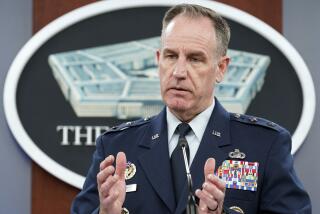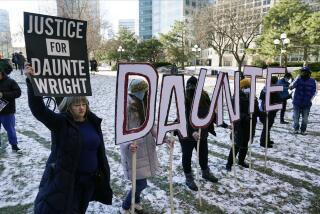Progress on key goals set for Iraq still elusive
- Share via
WASHINGTON — The Bush administration’s status report Thursday on the Iraq war gives the Iraqi government an even mix of “satisfactory” and “unsatisfactory” grades, but a closer look provides a more sobering impression: The least progress is being made on the most important goals.
Among the areas in which the administration reports unsatisfactory progress are legislation on sharing oil revenue, provincial elections and the easing of restrictions on government employment for members of the former ruling Baath Party. Adequate progress is reported on less important matters such as forming committees to examine the Baghdad security plan and review the constitution.
Moreover, some of the initial progress cited in the report may be difficult to build on. Initiatives pushed by the U.S. have run aground because of the Iraqi government’s limited clout and the sectarian divisions that have riven the country. For instance, there has been little progress in months on the oil law, which earlier this year appeared promising.
Overall, the interim progress report, required by Congress, is an unsparing assessment of advances on the benchmarks over the last six months. It reflects the difficulty of attaining goals set months ago and underscores the uncertainty of the future.
“The security situation in Iraq,” the report says, “remains complex and extremely challenging.”
But in many respects, the report also downplays the importance of the goals it set out to assess.
Some of the political goals may not be achieved until there is stability and political compromise at the local level, it says.
Iraqi leaders appealed to U.S. officials not to impose deadlines on them and expressed frustration that the list of goals had become a political football in Washington.
U.S. military officials said that the benchmarks laid out by Congress did not adequately measure progress by American forces, including weakening Sunni Arab militant groups and cutting deals with Sunni tribes to help reduce the violence in Al Anbar province.
“Because it is a very narrow set of benchmarks, we think that there are other indicators that we are tracking that are a more fulsome representation of how things are going on the ground,” said a senior Defense official who spoke on condition of anonymity because he was not authorized to discuss the contents of the report.
By focusing on the achievements of the Iraqi government, the benchmarks overlook advances by U.S. forces, a senior U.S. military officer in Baghdad said. “These aren’t the benchmarks we would have chosen,” the officer said.
Many of the goals on which the government earned “satisfactory” marks were at best procedural. But where real political compromise was demanded, results were more disappointing.
On the security front, the report gives the Iraqi government generally satisfactory marks for setting up joint U.S.-Iraqi security stations and for moving more combat troops into Baghdad. But on the harder benchmarks of pushing Iraqi security forces to operate independently and free from sectarian influence, the report says progress has been unsatisfactory.
It has long been a U.S. goal to increase the number of Iraqi security forces that can operate independently. But since January, the number of Iraqi soldiers with that capability has declined, partly because of troops killed in combat and a shortage of officers.
When the new security plan was announced in January, officials said that it was crucial that the Iraqi government give military commanders authority to pursue extremists without political interference. But the report gives the government a unsatisfactory mark for that goal, concluding that “there remains a negative political influence at a variety of levels with evidence of sectarian behavior.”
The report also says political authorities continue to “undermine and make false accusations” against police and army officers, suggesting that trumped-up charges are used to drive Sunni officials from the Iraqi security forces. And the government has been unable to ensure that its security forces do not act along sectarian lines.
“Left on their own, many ISF units tend to gravitate to old habits of sectarianism when applying the law,” the report says.
The assessment also reflects shifting U.S. priorities. Two benchmarks once regarded as important, amnesty for ex-insurgents and the disarming of militias, were described as inconsequential or impossible to achieve.
“There is no momentum in the government of Iraq toward developing and implementing a comprehensive disarmament program for militia members,” the report says. It argues that rather than focusing on disarming militias, the government should make jobs and other economic development programs its priority.
On the political side, the interim assessment reports progress on a number of areas. But on the steps considered most important, progress was slow or nonexistent.
There has been wide agreement that the three most important political steps are passage of the oil law, de-Baathification reforms and provincial elections.
The report acknowledges that de-Baathification reforms, aimed at bringing low-ranking members of former President Saddam Hussein’s Baath Party back into the government, have stalled. Progress on setting a date for provincial elections is unsatisfactory, it says, noting also that there is insufficient progress on establishing an independent electoral commission and defining the structure and authority of local governments.
The report says there is not enough progress on the oil law, but hedges this finding, saying that it is “too early to tell” whether the government ultimately will pass legislation fairly dividing oil revenue among the three key Iraqi ethnic and sectarian groups.
Echoing President Bush, the report argues that the substantial political developments demanded by Congress will not be quick in coming and says it is unfair to expect political reconciliation unless security improves.
--
Times staff writers Paul Richter and Doyle McManus in Washington and Ned Parker in Baghdad contributed to this report.
--
(BEGIN TEXT OF INFOBOX)
Progress report
Congress required President Bush to submit an initial report by Sunday assessing whether the Iraqi government had made satisfactory progress toward achieving the benchmarks set by his administration. A breakdown:
Unsatisfactory
* Enacting and implementing legislation on de-Baathification.
* Enacting and implementing legislation to ensure the
equitable distribution of oil
resources among Iraqis without regard to sect or ethnicity, and to ensure that such resources benefit all groups equitably.
* Giving Iraqi military commanders the authority to execute the Baghdad security plan and to make tactical and operational decisions, in consultation with U.S. commanders, without political intervention, including the pursuit of all extremists, including Sunni insurgents and Shiite militias.
* Ensuring that the Iraqi security forces enforce the law evenhandedly.
* Increasing the number of Iraqi security force units capable of operating independently.
* Ensuring that Iraq’s political authorities are not undermining or making false accusations against members of the Iraqi security forces.
--
Unsatisfactory, but with some aspects of progress
* Reducing the level of sectarian violence and eliminating militia control of local security.
* Enacting and implementing legislation establishing an independent electoral commission, provincial election law, provincial council authorities and a date for provincial elections.
--
Satisfactory
* Forming a constitutional review committee and completing the constitutional review.
* Enacting and implementing legislation on procedures to form semiautonomous regions.
* Establishing political, media, economic and services committees in support of the Baghdad security plan.
* Providing three trained and ready Iraqi brigades to support Baghdad operations.
* Ensuring that the Baghdad security plan will not provide a safe haven for outlaws, regardless of sectarian or political affiliation.
* Establishing all of the planned joint security stations in neighborhoods across Baghdad.
* Ensuring that the rights of minority political parties in the Iraqi legislature are protected.
* Allocating and spending equitably $10 billion in Iraqi revenue for reconstruction projects, including delivery of essential services.
--
Too early to assess or of questionable value
* Enacting and implementing legislation addressing amnesty for former insurgents.
* Enacting and implementing legislation establishing a strong militia disarmament program to ensure that security forces are accountable only to the central government and loyal to the Constitution of Iraq.
Source: Associated Press
More to Read
Sign up for Essential California
The most important California stories and recommendations in your inbox every morning.
You may occasionally receive promotional content from the Los Angeles Times.













